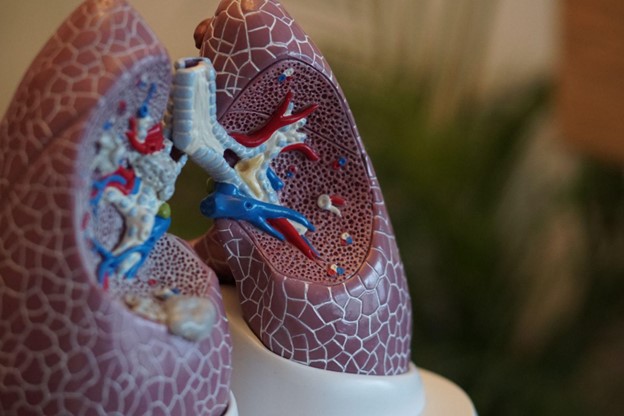Idiopathic Pulmonary Fibrosis (IPF) is a serious chronic lung disease characterized by the thickening and stiffening of the lung tissue surrounding the air sacs.
LA JOLLA, CA / ACCESSWIRE / September 1, 2023 / Idiopathic Pulmonary Fibrosis (IPF) is a serious chronic lung disease characterized by the thickening and stiffening of the lung tissue surrounding the air sacs. The exact cause of IPF is unknown, but it is believed to involve a combination of genetic and environmental factors. Scarring and fibrosis of lung tissue lead to the loss of the lungs’ ability to effectively transfer oxygen to the bloodstream, leading to shortness of breath and decreased lung function.

As the disease progresses, patients experience increasing difficulty breathing and reduced exercise tolerance, significantly impacting their quality of life. Eventually, lung function becomes severely impaired, leading to respiratory failure and the need for supplemental oxygen or lung transplantation.
IPF has a poor prognosis, with a median survival time of 2-5 years from the time of diagnosis. The average age of diagnosis is around 66 years old. The disease is often diagnosed in its advanced stages when irreversible lung damage has already occurred, making treatment options limited. Currently, there is no cure for IPF, and available treatments focus on slowing the progression of the disease and managing symptoms. Without a lung transplant, the survival rate is 0%.
IPF can be unpredictable and may be associated with acute exacerbations, which are sudden and severe worsening of symptoms. These exacerbations can lead to respiratory failure and are associated with a high mortality rate.
GRI Bio (NASDAQ:GRI) is a clinical-stage biopharmaceutical company that is dedicated to revolutionizing the way that inflammatory, fibrotic and autoimmune diseases are treated, including IPF. The company’s mission is to develop life-changing therapies that interrupt disease progression and restore the immune system to its normal state of balance.
GRI Bio’s unique approach centers around NKT cells, which are key regulators earlier in the inflammatory cascade. These cells are innate-like T cells that share properties of both NK and T cells and are a functional link between the innate and adaptive immune responses. Specifically, the type I invariant NKT (iNKT) cells play a critical role in propagating the injury, inflammatory response and fibrosis observed in inflammatory and fibrotic indications. GRI Bio is focused on developing therapies that inhibit iNKT cell activity to interrupt disease progression and restore homeostasis in the immune system.
GRI-0621 is a drug therapy developed by the company that targets human iNKT cells. It is a small molecule RAR-βɣ dual agonist that works by inhibiting the activity of these cells, which are known to be involved in the inflammatory cascade leading to the development of fibrotic disorders such as IPF. By targeting upstream in the inflammatory cascade, GRI-0621 has the potential to provide greater efficacy compared to other treatments in development.
GRI Bio reports that late-stage studies of this molecule have already demonstrated a favorable safety profile, making it a promising candidate for the treatment of IPF and other fibrotic diseases. Additionally, the drug has been shown to improve liver function tests (LFTs) and reduce aminotransferases in patients, as well as improve fibrosis in multiple disease models. Multiple animal models have demonstrated the ability of iNKT inhibition to resolve fibrosis, which is a significant finding considering that fibrosis is one of the key hallmarks of IPF.
GRI Bio is repurposing GRI-0621 as a once-daily oral capsule for the treatment of IPF. The drug also has significant IP protection with issued medical use patents through 2032 and potential market exclusivity through 2036 or beyond, which is beneficial for the company’s development and distribution of the drug. With extensive IP protection, GRI Bio has a valuable opportunity to develop and distribute this treatment in the future.
While companies like Pliant Therapeutics Inc. and Insilico Medicine are researching IPF, GRI Bio’s unique approach targets NKT cells earlier in the inflammatory cascade - setting it apart from the crowd. GRI-0621 seems to be a promising candidate for the treatment of IPF and other fibrotic indications due to its favorable safety profile, potential efficacy and ability to resolve fibrosis by inhibiting iNKT cells.
Featured photo by Robina Weermeijer on Unsplash.
Contact:
Jenene Thomas
jenene@jtcir.com
SOURCE: GRI Bio, Inc.
View source version on accesswire.com:
https://www.accesswire.com/779395/ipf-has-a-0-survival-rate-without-lung-transplant-and-a-median-survival-time-of-2-5-years-from-diagnosis--could-gri-0621-be-the-solution




